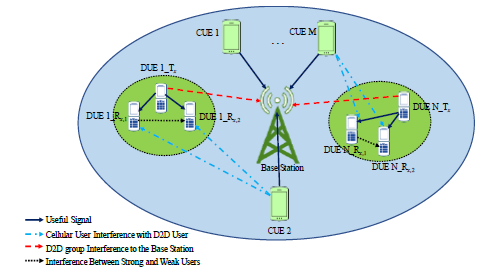An Efficient Resource Allocation Algorithm for D2D Communications Based on NOMA
Objective
This paper proposes a joint sub-channel and power allocation algorithm for D2D communication based on NOMA to maximize the uplink energy efficiency and throughput of the mobile communication system.
Abstract
This paper proposes a joint sub-channel and power allocation algorithm for D2D communication based on NOMA to maximize the uplink energy efficiency and throughput of the mobile communication system.
The performance of the future mobile communication system could greatly improve as a result of Device-to-Device (D2D) communication and Non-Orthogonal Multiple Access (NOMA). Reduction of the interference between the D2D users and cellular users is crucial in improving the overall throughput and efficiency of the D2D communication based on NOMA.
The algorithm uses the Kuhn-Munkres (KM) technique to allocate a channel for each D2D group and formulates an optimal power allocation problem using Karush-Kuhn-Tucker (KKT) conditions. Simulations indicate that the proposed algorithm outperforms the current state-of-the-art algorithms in regards to energy efficiency and throughput under different network conditions.
Keywords: Non-Orthogonal Multiple Access (NOMA), Device-to-Device (D2D), 5G, Power Allocation, Interference Management, Energy Efficiency
NOTE: Without the concern of our team, please don't submit to the college. This Abstract varies based on student requirements.
Block Diagram

Specifications
Software: Matlab 2018a or above
Hardware:
Operating Systems:
- Windows 10
- Windows 7 Service Pack 1
- Windows Server 2019
- Windows Server 2016
Processors:
Minimum: Any Intel or AMD x86-64 processor
Recommended: Any Intel or AMD x86-64 processor with four logical cores and AVX2 instruction set support
Disk:
Minimum: 2.9 GB of HDD space for MATLAB only, 5-8 GB for a typical installation
Recommended: An SSD is recommended A full installation of all Math Works products may take up to 29 GB of disk space
RAM:
Minimum: 4 GB
Recommended: 8 GB
Learning Outcomes
- Introduction to Matlab
- What is EISPACK & LINPACK
- How to start with MATLAB
- About Matlab language
- Matlab coding skills
- About tools & libraries
- Application Program Interface in Matlab
- About Matlab desktop
- How to use Matlab editor to create M-Files
- Features of Matlab
- Basics on Matlab
- Basics of wireless communications
- About D2D communications
- How system modal can be formed in Matlab.
- Construction of algorithm according to system modal
- Analyzing and visualization of plots.
- Phases of data transmission:
- Generation of input signal
- Construction of transmitter
- Formation of channel
- Construction of receiver
- How to extend our work to another real time applications
- Project development Skills
- Problem analyzing skills
- Problem solving skills
- Creativity and imaginary skills
- Programming skills
- Deployment
- Testing skills
- Debugging skills
- Project presentation skills
- Thesis writing skills





 Paper Publishing
Paper Publishing
